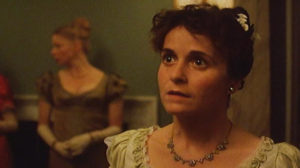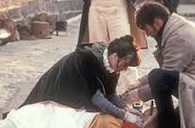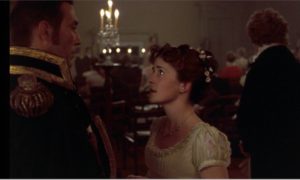Anne Elliot: A quiet force to be reckoned with.
Lizzy Bennet may be the one with all the flash and sparkle, but one should never underestimate one of Austen’s more reserved heroines, Anne Elliot of Persuasion.

Ciaran Hinds as Captain Wentworth and Amanda Root as Anne Elliot in “Persuasion,” directed by Roger Michell
At first glance, Anne may not seem to fit the typical ideal of a cape-wearing, save-the-day superhero, but let’s take a closer look at Miss Anne:
Austen Superpower 1: Grace under Fire.
Who had the presence of mind that no one else had when Louisa Musgrove fell from the Cobb at Lyme?
That’s right; Anne Elliot did. Everyone else was wailing and flailing while she was the voice of calm and reason in the midst of the emergency. She was the one who gave Captain Wentworth calm and rational directions as to how to help Louisa.
Austen Superpower 2: Trusting Observation and Instinct.
Who realized that Captain Wentworth was in love with her–despite his eight years of silence after she broke his heart, despite his ignoring her while happily being the Musgrove girls’ object of worship, and despite everyone else being ready to marry him off to Louisa Musgrove?
You got it; Anne Elliot. Though not by any stretch of the imagination conceited or vain, and despite having been brought up to think of herself as beneath the notice of everyone in her family (aside, that is, from Lady Russell and Anne’s own dear, departed mother ), this gentle soul’s keen gaze penetrated to Captain Wentworth’s very soul. She knew–knew, I say!–that he cared for her again. 
She knew this not from any direct declaration of Captain Wentworth’s, but from the way he talked of the unsuitability of the engagement of his friend Benwick to Louisa, and of Benwick’s inconstancy to Benwick’s fiancee, who died only a short time before.
Austen Superpower 3: The Courage to Act
Anne not only KNEW this, she acted upon it–granted, within the very limited means that a lady of her time was authorized to act, for as Anne herself said of the lot of females in general in the time of Jane Austen:
“We live at home, quiet, confined, and our feelings prey upon us.”
How did she act upon it? She encouraged Captain Wentworth to stay at the concert when jealousy of his rival, Mr. Elliot, was driving him away. She wasn’t successful, but her encouragement may have given him something to think about.
She expressed her feelings about female constancy to Captain Wentworth’s dear friend Captain Harville. She did this not because she knew–which she did not–that Captain Wentworth could overhear her, nor did she do it because she imagined that Captain Harville might repeat her words to Captain Wentworth. No, she acted purely out of a wish to defend the integrity of women’s feelings that she so passionately believed in, and as a mark of her friendship with Captain Harville.
And that was enough to jolt Captain Wentworth out of his comfort zone and into declaring his own feelings.
How can we cultivate our own inner Anne Elliot?
When in doubt, read the book. And/or see the movie(s).



We can also contemplate the following passages to cultivate each of Anne Elliot’s Austen superpowers:
Grace under fire.
Check out Miss Anne in the aftermath of Louisa Musgrove’s fall from the Cobb. This is the girl you’d want by your side in any emergency. Here are some snippets of Anne taking charge while everyone around her falls apart, including Captain Wentworth, who holds the unconscious Louisa in his arms; Louisa’s sister Henrietta, who falls into a faint at the sight of her sister; and Louisa’s brother Charles Musgrove, whose wife Mary is in her usual hysterics. 
Anne not only suggests they fetch a surgeon, but makes sure that Captain Benwick, who knows the area, is the one to do it. As they wait for the surgeon:
Anne, attending with all the strength and zeal, and thought, which instinct supplied, to Henrietta, still tried, at intervals, to suggest comfort to the others, tried to quiet Mary, to animate Charles, to assuage the feelings of Captain Wentworth. Both seemed to look to her for directions.
“Anne, Anne,” cried Charles, “What is to be done next? What, in heaven’s name, is to be done next?”
Captain Wentworth’s eyes were also turned towards her.
“Had not she better be carried to the inn? Yes, I am sure: carry her gently to the inn.”
“Yes, yes, to the inn,” repeated Captain Wentworth, comparatively collected, and eager to be doing something. “I will carry her myself. Musgrove, take care of the others.”
The courage to act.
When Captain Wentworth walked in alone to the concert in Bath, Anne had the courage to approach him and be friendly to him, despite the presence of her formidable father and sister, who had snubbed him previously. It doesn’t sound like much, but for a young single woman whose family had absolutely rejected him as a suitor eight years before and who herself had been rejected in turn by that man when he returned from the war, Anne’s actions show tremendous courage and integrity: 
Anne was the nearest to him, and making yet a little advance, she instantly spoke. He was preparing only to bow and pass on, but her gentle “How do you do?” brought him out of the straight line to stand near her, and make enquiries in return, in spite of the formidable father and sister in the back ground. Their being in the back ground was a support to Anne; she knew nothing of their looks, and felt equal to everything which she believed right to be done.
Trusting observation and instinct.
After Anne has a world-changing conversation with Captain Wentworth before a concert in Bath, in which he talks to her, for the first time, about the engagement of his friend Captain Benwick to Louisa Musgrove, she reviews it all in her head, and she doesn’t second-guess her observations at all:
His choice of subjects, his expressions, and still more his manner and look, had been such as she could see in only one light. His opinion of Louisa Musgrove’s inferiority, an opinion which he had seemed solicitous to give, his wonder at Captain Benwick, his feelings as to a first, strong attachment; sentences begun which he could not finish, his half averted eyes and more than half expressive glance, all, all declared that he had a heart returning to her at least; that anger, resentment, avoidance, were no more; and that they were succeeded, not merely by friendship and regard, but by the tenderness of the past. Yes, some share of the tenderness of the past. She could not contemplate the change as implying less. He must love her.
The same keenness of observation serves Anne well with respect to Captain Wentworth’s rival, Mr. Elliot:
Mr. Elliot was rational, discreet, polished, but he was not open. There was never any burst of feeling, any warmth of indignation or delight, at the evil or good of others. This, to Anne, was a decided imperfection. Her early impressions were incurable. She prized the frank, the open-hearted, the eager character beyond all others. Warmth and enthusiasm did captivate her still. She felt that she could so much more depend upon the sincerity of those who sometimes looked or said a careless or a hasty thing, than of those whose presence of mind never varied, whose tongue never slipped.
Doesn’t it make you want to read Persuasion again? Or for the first time? Oh yes, you are in for a treat!
Read on, my dears, and may you be blessed with Austen superpowers!


